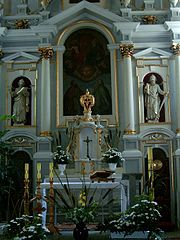
A History Of The Mass And Its Ceremonies In The Eastern And Western Church -Rev John O'Brien A.M.
NUMBER OF COLLECTS SAID IN THE MASS
On occasions of great solemnity the general rule prescribes but one Collect, but on ordinary occasions three is the number. It is forbidden to say more than seven at any time, and this number is rarely reached unless when some special commemorations are made. According to liturgical commentators, one prayer mystically represents the unity of our faith; three are said in honor of the Blessed Trinity, and in memory of our Lord’s praying thrice in the Garden of Olives; five commemorate his five wounds; and by seven we are reminded of the seven gifts of the Holy Ghost (Bouvry, ii. 128; Durandus, Rationale Divin., p. 181). Whatever be the number of the Collects, none others may be said unless those given in the missal. As far back as the year 416 laws were made by the Council of Milevi, in Africa, forbidding under severe censures the introduction of any prayers into the Mass except those approved of by legitimate authority. This discipline is yet strictly observed.
Prayers of the Oriental Church.—The prayers used by the Orientals are much more numerous than ours, as may be readily seen from any one of their liturgies. In length, too, they far exceed those that we employ, for which reason alone the service of Mass in the East occupies nearly twice the time that ours does. The Copts generally add prayers for the favorable flow of the Nile, which is to them one of the chief sources of temporal blessings, for the entire vegetation and fecundity of Egypt depends upon its inundations. The “Oratio fluminis,” or Prayer of the River, is thus worded: “Remember, O Lord! the waters of the river, and bless and increase them according to their measure.”
Copyright ©1999-2023 Wildfire Fellowship, Inc all rights reserved

 Keep Site Running
Keep Site Running